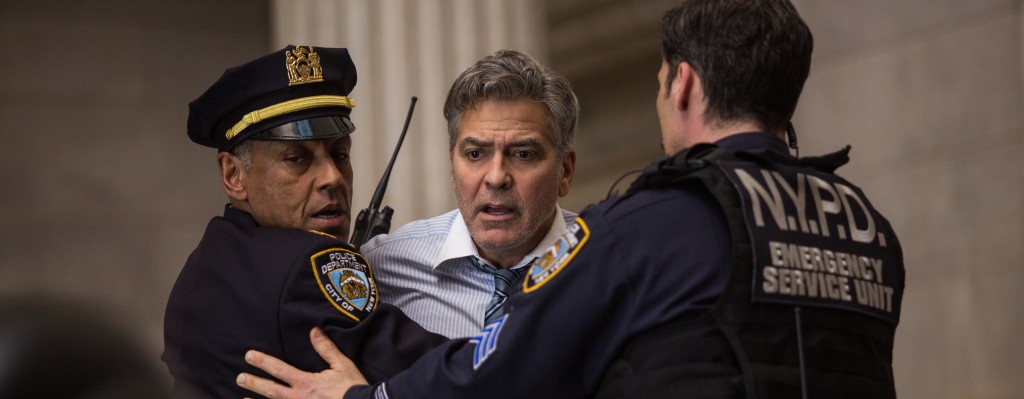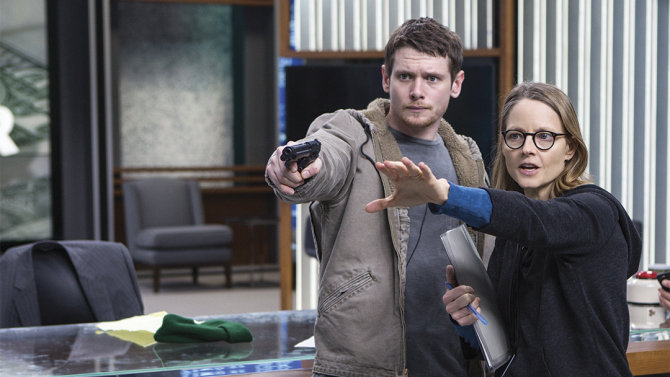Alex writes about Money Monster, a perplexing film.
Money Monster is a terribly bizarre film that frequently borders on being straight-up terrible. It oscillates between being a superb action movie, a throwback to a bygone version of Hollywood, a collection of things George Clooney can’t pull off, and a wannabe thinkpiece that sporadically yells “MESSAGE!” at you, a la Keenen Ivory Wayans in 1996.
Directed by Jodie Foster, the film sometimes seems to be spiraling out of her control, until another expertly staged scene swoops in just in time to halt another batch of eye-rolls. In short, it is a film that is hard to pin down. Contrasting the rich and informed with the poor and trusting, Money Monster is a movie about assuming control that is itself never fully controlled.
And yet that criticism also elucidates its greatest strength.
As Money Monster unfolds in real-time (more or less), a variety of expected things take place. We get the introductory rigmarole, as George Clooney and Julia Roberts run through the rundown of that day’s show, before Jack O’Connell and his all-time bad New York accent take their television studio hostage. Clooney’s Lee Gates – a Jim Cramer facsimile – is a classic rich, clueless, overfed alcoholic who has no idea how to react to the situation. His director Patty, played by Roberts, is in the control booth, and even though she doesn’t know how to react either, she stays there, telling Lee what to and when to do it, filling in the gaps of information that he wouldn’t otherwise know. Patty is the show’s director, Gates’ guidance, and she is the film’s most interesting character.
What Roberts represents as Patty is somebody who is in control, but whose control has suddenly been ripped away from her. When Patty came in to start her day, she knew what was happening, because today would be just like every other day. She knew what was on the rundown, and she knew what would be accomplished. Even though her talent is an unpredictable person who likes to wander off-script, Patty still knows how to massage him into something she can control, so that the show can go off without a hitch.
And then that delivery guy walked past Grizz and it all went to shit.
As Patty’s day descends into bomb-strapped madness, we immediately see her snap into survival mode. She does not waver in her decisions; she does not collapse onto the ground and start crying. Patty tells her non-essential crew to leave the studio, and continues to remain as a crucial middleperson between the police and O’Connell. Even after the situation leaves the studio, she follows along in a mobile production van, knowing her voice still needs to be heard for this situation to properly resolve.
An action film – especially one involving hostages – is pretty much always a struggle for control. (Admittedly, most films, novels, narrative songs, whatever, are as well, at least in some capacity.) Jodie Foster and company were not exactly reinventing the wheel with Money Monster. But what they do by overstuffing the film is allow just enough of their ideas to come through in a meaningful way. By making the film too messy to be perfect, it accidentally perfects the one thing I love about the film.
One of the easiest criticisms to put forward about this film is that it arrives a few years too late. The Jim Cramer inspiration feels outdated for some reason, even though his show is still on the air. Money Monster’s critique of Big Money was recently done to better effect in The Big Short. Even casting Julia Roberts and George Clooney feels a little behind the times (albeit this time in a welcome way). When it comes to creating a film about our most modern of ills, JoFo is no pro.
But what we see depicted in this film is a modern person, who knows their day will be a certain way, and she will be able to exert control over it however she sees fit. Patty is a woman who has the tools and the skills to be in a position of control. She will take an Uber to the studio, order lunch via Served by Stadium. She is able to do everything, but the things that matter the most can still be changed at the drop of a stock.
Jodie Foster, as director of Money Monster, is a woman in control as well. She controlled every frame of this film before it was shot, and she had (at least almost) final approval on the delivery of the end product. She is probably quite happy with what she got across, and believes quite strongly that some will change their opinion on those in the white collars going forward. Foster probably believes this film is about, in descending order, the following: the folly of Big Money, the privileged screwing over the working class, the continued collapse of journalism, and making George Clooney look like an idiot.
And she is right. The movie is about all of those things. But fundamentally, it is about somebody in control who sees the thing they needed the most being taken away from them.
As mentioned previously, Patty has the control of her show taken away from her, much like Lee has control of his show (and potentially his life) taken away from him. The thing that pushed Kyle into his new profession of hostage taking was when his inheritance was taken away from him because he chose to trust Lee with his money. Walt Camby – CEO of IBIS, the company Kyle invested in – took the money Kyle invested (along with countless others’ money) and tried to bribe a politician in Johannesburg with it, causing the stock to drop dramatically, which leads to all of the above.
Even Camby, the film’s ostensible villain, ends up having control taken away from him. He thought he would get away clean until Diane, the woman he says he trusts even more than his wife rifles through his passport to uncover his travel-based lies. Diane then sets up the surprise interview that exposes Camby’s more thievery-based lies, which in turn causes him to lose control of his reputation. The film is non-committal when saying whether or not it really ruined Camby’s life, but if his career isn’t mummified, Camby has at least been meme-ified, his reputation forever altered into “that terrified rich guy jumping away from stuff on that Vine.”
Foster herself is not immune to this loss of control. I suspect my reading of this movie is pretty far from what Ms. Starling wants me to think, although I’m sure she would be accepting of any positive reading of her film at this point. But Foster wants me to think about the little person, and to hate the big person, and be wary of all the various machinations that keep each entity separated from the other. But what I saw in the movie – the thing Foster presumably did not intend – is precisely what allowed me to like this movie. Quite frankly, Foster fails to accomplish what she set out to. And, in spite of her failure, she made a good film.
To Foster’s (intentional) credit, there are two moments in Money Monster that legitimately surprised me. One of these moments was an effective rendering of something that is in line with the movie’s theme, and the other is something that is a part of the genre but is done in a totally opposite way to what we are meant to anticipate.
Midway through the film, Kyle’s pregnant girlfriend is brought to the studio to talk to Kyle via Skype, a tried and true diffusing tactic for movie cops all over the world. Kyle will see the love of his life and immediately see all the wrong he has done, and give over the bomb to the police in surrender. This is not what happens.
Pretty much as soon as she gets on camera, Molly immediately begins to cuss Kyle out and tell him how stupid he is. She even encourages Kyle to kill himself, which – to put it mildly – I did not fucking see coming. This is not how these hostage movies work: this pregnant woman is supposed to cry and yell, yes, but definitely not wish death on her boyfriend. It was a time-honoured tactic that the police thought they were using, and yet it backfired. The thing they always do didn’t work out so positively for them today.
This type of cliché upheaval is always interesting to me, and it tends to be the place where most movies excite me the most: you give me something I expect, but you give it to me in a different way than I am used to. Give me the standards slightly subverted. Give me what I expect to see, but offer a different viewpoint on it. Take the day I expected to have, and make it more interesting than I could have anticipated.
Later in the movie, as Lee and Kyle are on the move to an interview with IBIS CEO Walt Camby, we see them passing through a police-guided gauntlet of people yelling at them. Lee sees people dancing like he does at the intro to his show, and Kyle finds people yelling at him as if he were no different than another common criminal. In each instance, what the character thinks about themselves and how people actually see them is totally different. The way you see something inside the confines of your skull is never how it really appears on the outside, and only occasionally will you be faced with such oppressive honesty.
I was certain Money Monster was going to be something I saw as a mere curiosity, potentially hated, but acted as a successful time-killing bridge before The Nice Guys started at 1:40. I basically saw Money Monster because it doesn’t have a long runtime, and could serve as a mere appetizer to the curse-laden main course that would be Shane Black’s new film. I was certain this was how my day would go. I was incorrect, because I always am.
And then I spent my evening writing this.
Invariably, the thing you believe the most stridently to be true will be proven false. The person you held up as an idol will crumble, or the institution you trusted with everything will stab you in the back. The only way to control your life is to assume you are never in control, to roll with whatever the punches may be, and not be too caught up in what could have been. When you do gain some semblance of control of your station, you can hold onto it with gusto.
But you must never assume it will still be there tomorrow, or else you might as well be stumbling around wearing an exploding vest.





